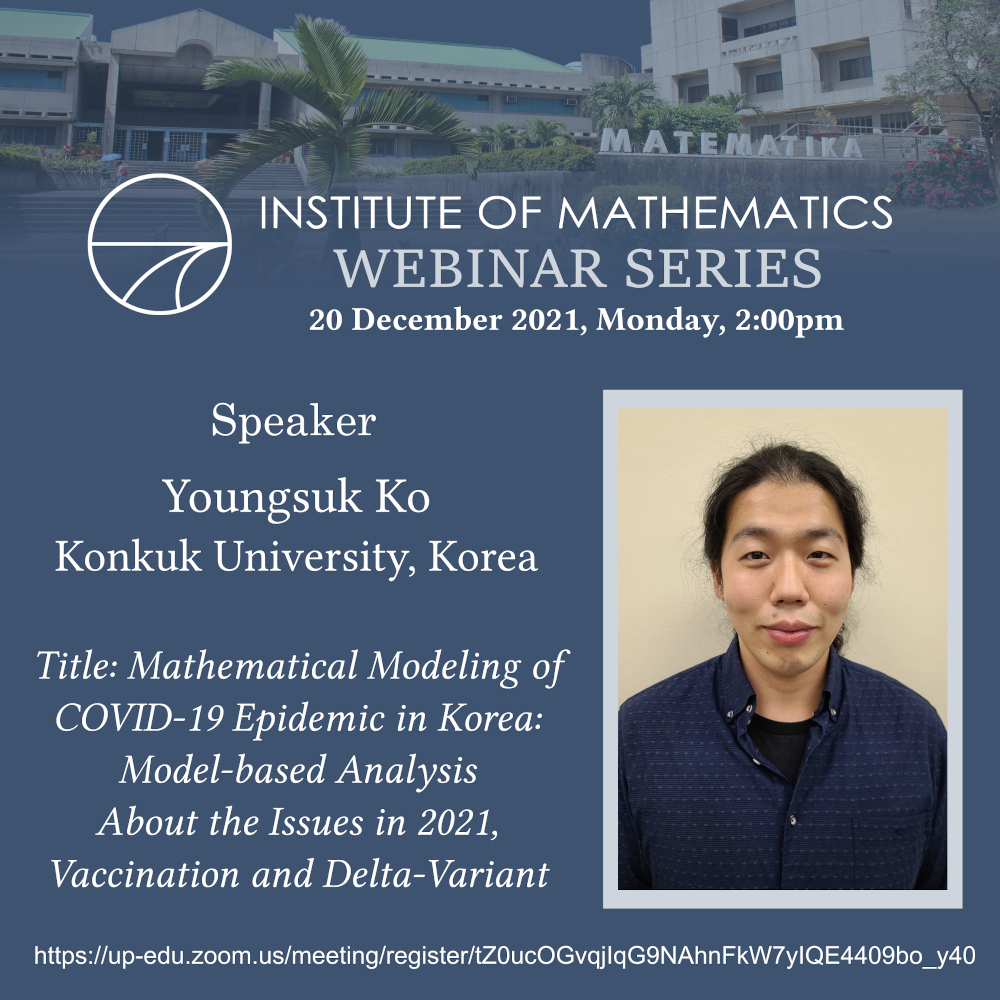IMath Webinar Series: Youngsuk Ko

You are all invited to attend the sixth webinar of the IMath Webinar Series for this semester on Monday, 20 December 2021, 2:00pm.
Youngsuk Ko of Konkuk University, KOREA, will present his work titled “Mathematical Modeling of COVID-19 Epidemic in Korea: Model-based Analysis About the Issues in 2021, Vaccination and Delta-Variant”. This is a joint work with Victoria May P. Mendoza, Jacob Lee, Yubin Seo, Yeonju Kim, Donghyok Kwon, and Eunok Jung.
Abstract: Since the end of 2019, the COVID-19 pandemic has caused serious burden to entire society, especially the medical system. In Korea, since the first mass outbreak in 2020, there has been four epidemic waves and the epidemic is still ongoing. In this talk, the following issues will be discussed: how to distribute limited vaccine supply effectively in the early vaccination stage and how to set step-by-step recovery, which means easing social distancing. Two mathematical models will be introduced, a model which considers healthcare workers, age groups and vaccine, and another model where the Delta-variant strain is added. We applied maximum likelihood estimation to find transmission rates among different groups using individual COVID-19 case data in Korea. As results, we found that transmission rate is group-dependent, and groups have different risks. For example, healthcare workers have relatively higher risk of being infected. Furthermore, scenario-based study showed that the government’s elderly-and-healthcare-worker-first vaccination strategy during the early vaccination stage was effective to minimize mortalities. We will show the effect of social distancing under different levels in reducing transmission in the local community. Finally, considering different arrival timing of the Delta-variant and vaccine supply, our model simulation emphasizes that every intervention, social distancing, screening measure, and vaccination are important.
References:
[1] Myung IJ; Tutorial on maximum likelihood estimation. Journal of mathematical Psychology. 2003 Feb 1;47(1):90-100.
[2] Kim S, Kim YJ, Peck KR, Ko Y, Lee J, Jung E. Keeping Low Reproductive Number Despite the Rebound Population Mobility in Korea, a Country Never under Lockdown during the COVID-19 Pandemic. International journal of environmental research and public health. 2020 Jan;17(24):9551.
[3] Ko Y, Mendoza VM, Seo Y, Lee J, Kim Y, Kwon D, Jung E. Quantifying the effects of non-pharmaceutical and pharmaceutical interventions against COVID-19 epidemic in the Republic of Korea: Mathematical model-based approach considering age groups and the Delta variant. medRxiv. 2021.
